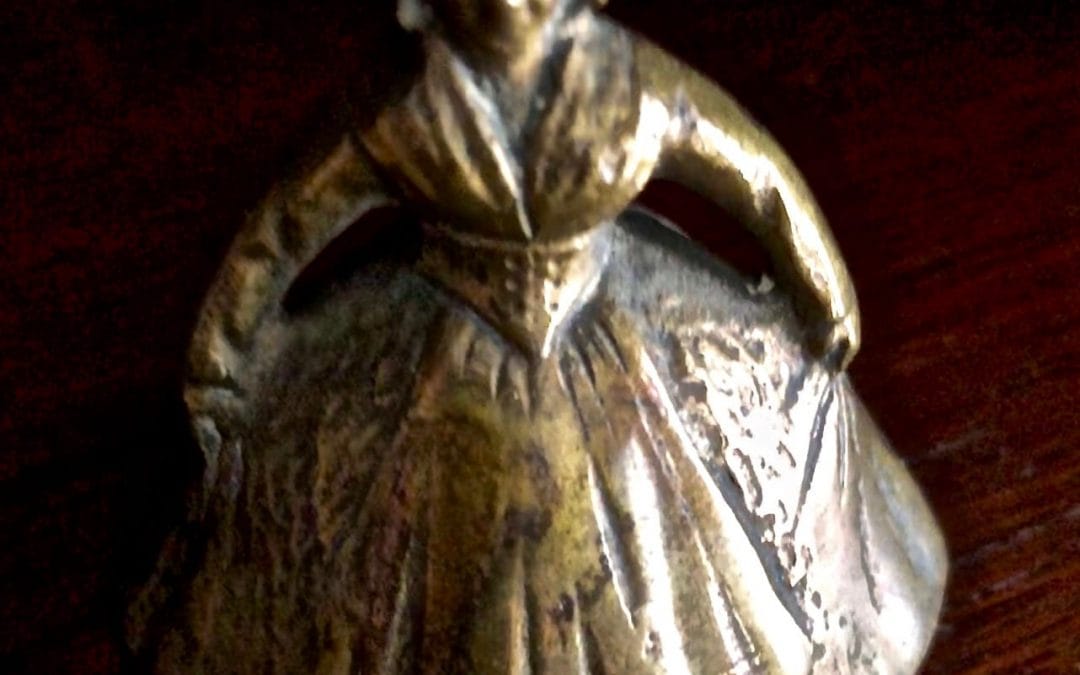My mother never traveled overseas but her one global connection was a Dutch pen pal relationship formed when the two were schoolgirls.
They never met (or talked by phone to my knowledge) but enjoyed this exclusively mail-based friendship well into adulthood.
Each year, the two distant and distinct families exchanged Christmas packages — though arrival times could vary by several months.
It was always an exciting time when the battered, string-bound box from the Netherlands (or Holland, as we knew it) arrived at our Ringgold, Ga., home.
 There were trinkets and bitter chocolates. And a letter updating my mom on the longtime friend she’d never met and her family.
There were trinkets and bitter chocolates. And a letter updating my mom on the longtime friend she’d never met and her family.
I don’t recall the family name and just a few of the specific gifts. The only remaining evidence of those many annual exchanges in my possession is the small brass Dutch girl bell.
Those good memories came to mind when reading about a much-less desirable, recent export.
In 2017, a horde of fundamentalist Christian leaders in the U.S. signed the so-called “Nashville Statement” — that foolishly and harmfully claims LGBTQ persons and those who affirm them “constitute an essential departure from Christian faithfulness and witness.”
(The city of Nashville, Tenn., where I recently enjoyed a wonderful weekend with my two daughters and two nieces, doesn’t deserve to have its name soiled in this way.)
However, this statement is not surprising, since religious and political fundamentalists consistently draw circles of exclusion — and scurry to find biblical support for their condemnation. (Remember the Curse of Ham?)
According to Baptist News Global and other news outlets, the Nashville Statement has now sadly made its way to Netherlands. About 250 fundamentalist Dutch pastors signed the translated document — drawing fierce push back from a counter “Declaration of Love” with more than 45,000 signatures.
One opposing organization, COC Nederland, released a statement saying: “This [Nashville] statement gives the impression that gay feelings can be changed, but dozens of research projects have shown that homosexuality cannot be changed with treatment and therapies, and that such treatments are downright dangerous.”
Indeed, recent studies suggest that heterosexual youth involved in church are less likely to commit suicide while homosexual youth in conservative faith communities are more likely to take their own lives. Repeatedly hearing that one is “an abomination to God” has consequences — especially when such condemnation is rooted in what a person cannot change.
Here in the U.S., the Nashville Statement is not an isolated religious fundamentalist attack on LGBTQ persons. NBC News reported recently on efforts by Liberty Counsel, an anti-gay rights group (with ties to Jerry Falwell, of course), to remove LGBTQ persons from protections in an anti-lynching bill passed unanimously by the U.S. Senate.
Efforts to exclude persons with same-sex attraction from God’s grace and the nation’s assurance of equal rights are atrocious and damaging enough here in America. They don’t need to be shipped abroad.
Exclusion and condemnation — especially in the name of Jesus — are shameful whether homegrown products or as exports. Bells and bitter chocolates are better offerings than bellowing bitterness.
-Visit nurturingfaith.net for daily religion news, thoughtful blogs, excellent books, inspiring experiences and to subscribe to Nurturing Faith Journal.
Director of the Jesus Worldview Initiative at Belmont University in Nashville, Tennessee and former executive editor and publisher at Good Faith Media.



